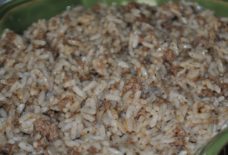The Politics of Pinkwashing: Equal Marriage Reverberations in Palestine
The US Supreme Court’s recent decision on marriage equality led to celebrations around the world. A very strong and loud message of support came from Palestinian artist Khaled Jarrar, who painted large rainbow stripes on the Israeli separation wall at Qalandiya checkpoint. He titled the piece “Through the Spectrum.” He intended for the rainbow – an icon of freedom, love, and humanity – to juxtapose the oppression represented by the wall.[1] Graffiti art, including works by Banksy, cover the 700 km wall that effectively turns the West Bank into an open-air prison.
Khaled Jarrar received an outpouring of support. Nonetheless, some members of the Palestinian community whitewashed his work that evening. What the artist says disturbs him the most about the incident is the media’s explanation that Palestinians are intolerant people who despise homosexuality. Although homosexuality is socially taboo in Palestine, the media’s readiness to represent the Palestinians as homophobic plays into a phenomenon called pinkwashing. Pinkwashing is the marketing of Israel as a safe haven for homosexuals, particularly in comparison to Palestine. The phenomenon deflects international attention away from Israel’s human rights record against Palestinians.
The effort to see context was largely absent from media discussions about the whitewashing. For many Palestinians, the LGBQT movement can be seen as a symbol of western imperialism. Academic Joseph Massad explains in his book Desiring Arabs that historically there has been ambivalent attitudes towards homosexuality in the Arab world. Massad claims that western human rights organizations have tried to impose a gay/straight binary on the Arab world, which before the modern era treated
homosexuality as a deviation and not as a problem. Massad argues that the west imposed labels for sexuality that were arguably out of synch with Arab sexual customs that did not persecute homosexuals. Whether or not one agrees with Massad’s ideas, the important matter is that the LGBTQ movement can be seen by some Palestinians as a symbol of western imperialism.For Palestinians, western imperialism, in any manifestation, is linked to the oppression they have experienced since the nakbah, or dispossession of their traditional homeland upon the foundation of the state of Israel in 1948. The Qalandiya checkpoint epitomizes the daily human rights abuses incurred by Palestinians living under the Israeli occupation. The Qalandiya checkpoint blocks West Bank Palestinians from freely entering Jerusalem, the city Palestinians claim as their capital and the international community views as illegally annexed by Israel since 1967. This abuse is aided and abetted by the United States government who supplies Israel with billions of dollars annually and provides political support through the UN Security Council veto. In the same week that America celebrated the equal marriage ruling, Obama signed into law the first federal anti-BDS provision.[2]
The location of the rainbow icon thus served for some Palestinians as salt on an open wound. One of my Palestinian Facebook friends wrote that Jarrar’s graffiti was “shameful.” He cringed that this western symbol was placed next to a painting of Yassir Arafat, who for many Palestinians represents resistance to the West. Qalandiya is a location where Palestinians often stage demonstrations against the Israeli occupation. Just a few weeks ago a senior Israeli military official killed a Palestinian teen at Qalandiya during clashes.[3] The rainbow icon for some Palestinians was a sanctioning of the West in a place of human rights abuse caused by the West.
Understanding the context of the whitewashing does not justify the incident. Nor should it obscure other bold moves of support for gay rights from the region, such as one of Egypt’s most popular actors, Khaled Abol Naga, who maintained a rainbow filter on his profile picture, despite subsequent press speculation on his sexuality.[4]
The whitewashing incident should draw our attention to the double standard Palestinians feel in human rights guarantees doled out and not doled out by the United States.
Source: www.counterpunch.org



